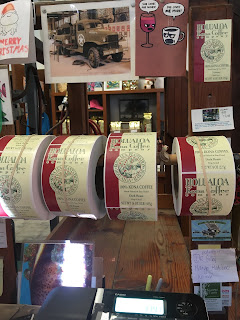Deep in the Emigrant Wilderness Area (north of Yosemite), after four days of backpacking, I was now standing at the top of a granite ridge, surveying the miles and miles, acres and acres, of wilderness around me. As far as the eye could see, it saw granite—mountains and valleys of granite; humps, steps, shelves, and peaks of granite; miles and miles of granite splotched here and there by green stands of trees that managed somehow to get a toehold in the granite. The distances were vast. I thought, "If two people were lost in there, no one would ever find them."
 |
| Not the scene I was looking at, but another place in the Emigrant Wilderness, showing the granite |
The thought was sobering because my backpacking partner and I were, at the moment, lost. We had no idea where on the map we were. We had gone off-trail, over the mountain and across the granite, thinking to go to Red Can Lake, but the lake we had come to was not Red Can. Now, looking into the granite slabs and mounds we had crossed to get where we were, I saw that retracing our steps would be impossible. There was no going back, and, not knowing where we were, we didn't know how to go forward, either.
For a brief moment, there on the ridge, looking into the chasms and peaks of granite, a flame of fear fluttered through me.
 |
| Another place off-trail in the Emigrant Wilderness |
But that was all. It was true that we were lost, but we had found a lake, which would have to be on the map somewhere. We were lost, but I was pretty sure we could find ourselves again.
We decided it would be smart to find a way out before making camp at the lake for the night, so we left our packs at a campsite and started looking for a route to a main trail or, best, to the historic cabin and barn we had passed in the forest hours and hours earlier in the day, another lifetime earlier, when we knew where we were.
Not far from our campsite, we discovered a line of cairns. Following it, we went up the mountain, to the ridge from which I surveyed the vastness of the wilderness. Apparently the cairns would take us over the ridge to the other side, except we didn't want to go up any farther; we wanted to go down, to known territory, so we left the ridge and went back to the lake to try the other direction.
Now we followed the stream flowing from the lake down the mountain. Pretty soon we crossed the stream to climb on the rocks, where the walking was easier and where we found another line of cairns, this time heading down the mountain. At a vantage point, my hiking partner gazed at a distant clump of trees and said, "That's where the cabin is. I'm sure of it."
I hoped he was right as well as sure. He had been sure before. For the past couple of hours he had been studying map and compass, trying to figure out why he wasn't also right.
Back at the campsite, I sat on a rock to write in my journal. He disappeared with his compass and map. Twenty minutes later he was back. "I think I know where we are," he said. He showed me Five-acre Lake on the map.
Back at the campsite, I sat on a rock to write in my journal. He disappeared with his compass and map. Twenty minutes later he was back. "I think I know where we are," he said. He showed me Five-acre Lake on the map.
Everything fell into place: the shape of the lake, the contour lines of the ridge, the stream leading to the woods where the cabin was. If we were really at Five-acre Lake, it looked like the line of cairns we had followed to the top of the ridge would take us over the top and down to Leighton Lake and that the streambed-and-cairns trail would, as predicted, take us to the old cabin.
I was tempted to go up and over the ridge the next day. The high mountains were so beautiful! And I would love to swim in Leighton Lake. But more than anything, I wanted to be on a trail marked on the map.
The next morning I took a swim in pretty, little Five-acre Lake.
 |
| Morning swim |
Suddenly I saw a barbed-wire fence in front of me and, just beyond it, the cabin and barn.
I have never been so happy to see barbed wire. We were found! We gave each other a joyous hug, then hefted our backpacks again for the continued hike to the trailhead. Even the snow that fell later that afternoon, as we lay in the tent weathering what we thought was rain, was small potatoes of inconvenience compared to being lost in the wilderness, even if only for half a day.
Bob is good with a map and compass, but I was relieved to hear him say he thought he would get a GPS before he went into the wilderness again.
Bob is good with a map and compass, but I was relieved to hear him say he thought he would get a GPS before he went into the wilderness again.





